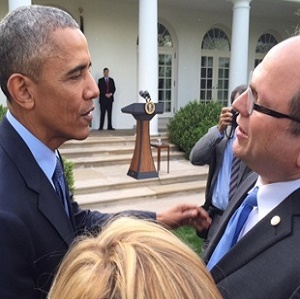
2015 marked sweeping changes and improvements in family medicine -- changes that affected physician payments, increased access to care, and took some of the burdens off health care administrators.
In March, American Academy of Family Physicians (AAFP) board members met with Surgeon General Vivek Murthy and Jeanne Lambrew, President Barack Obama's deputy assistant for health policy. Murthy discussed initiatives for immunizations, childhood obesity, substance abuse and mental health.
That month also saw AAFP's then-President Robert Wergin testify before the Senate Committee on Health, Education, Labor and Pensions about the AAFP's concerns about electronic health records (EHR), saying they create difficulties with regard to patient contact.
In April, Medicare's sustainable growth rate (SGR) was repealed after 12 years of work by representatives of the AAFP. Had the SGR remained in place, Medicare payments may have been slashed by up to 21 percent.
When the repeal happened Wergin was in Washington, D.C. and thanked Obama.
The SGR was replaced with two new payment models: Merit-based Incentive Payment System (MIPS) or alternative payment models (APMs). Physicians will be able to choose which system works best for them, and the new systems will be phased in over two years.
"The AAFP remains very concerned that the MIPS and APM programs will be built upon the biased and inaccurate relative value data currently used in the fee-for-service system," AAFP officials wrote in a letter to officials at the Centers for Medicare and Medicaid Services. "We strongly recommend that more be done to ensure Medicare pays appropriately for primary care physician services in these new payment models rather than paying based on this biased actuarial data that further exacerbates the undervaluation of primary care services."
In October, the AAFP backed the formation of a Congressional Primary Care Caucus in the House of Representatives, which was developed to address the shortage of primary care physicians in America's rural areas.
November saw AAFP representatives meet with House and Senate lawmakers about Stage 3 of the Medicare and Medicaid EHR Incentive Program's meaningful use criteria and their objections to it.


